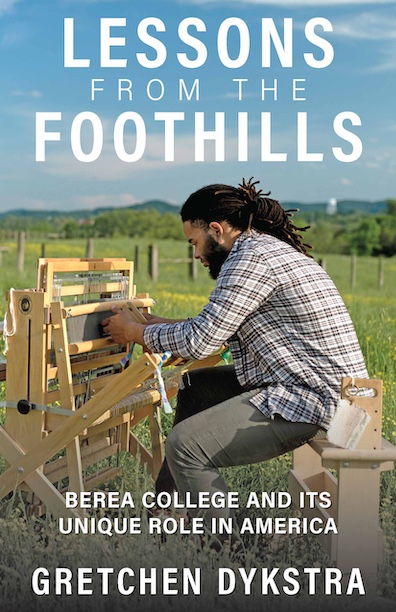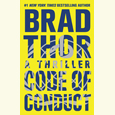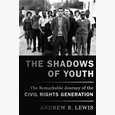In Collapse There Is Light
Three new collections illuminate times of transformation
FROM THE CHAPTER 16 ARCHIVE: This review originally appeared on December 5, 2023. The post has been updated with new event information.
***
Erin Hoover’s No Spare People
In “At the child support office,” an early poem in Erin Hoover’s new collection, No Spare People, the speaker must maneuver a bureaucracy that resists recognizing the two-person family she’s created with her daughter, conceived through artificial insemination. At issue is what answer she’ll give when asked to name the child’s father.
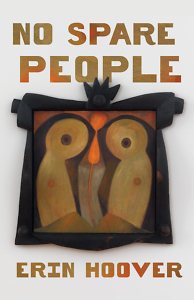 The speaker presses through a gauntlet of assumptions and prejudices. But she leaves that office having defined her family for herself: “I fought for that blank space.”
The speaker presses through a gauntlet of assumptions and prejudices. But she leaves that office having defined her family for herself: “I fought for that blank space.”
This line resonates throughout the collection, in poems that unpack their speakers’ relationships to political activism, social dynamics among women across generation, ideological camp, and economic class. Hoover’s poems insist on claiming their own space. Within these spaces arise thoughtful, nuanced observations and confrontations.
Hoover teaches at Tennessee Tech University, but her poems reflect an outsider’s perspective on Southern communities. “I’ve never been so queer as I am / in the South.” These poems’ speakers are unapologetic in their candor. But they hold themselves accountable as much as they challenge others, reflecting the interconnectedness of the failing social systems they face at every turn: “This isn’t a confession but the facts that surround us.”
Those facts include the emotional risks of single parenthood, the collapse of the academic job market, the hard-won revelations of midlife, the “death parade” of pandemic life, and the endless doom-scroll of contemporary America’s economic, racial, and gender disparities. Hoover articulates these dilemmas with tough-minded, startling clarity.
Throughout No Spare People, Hoover returns to the choice of motherhood on her own terms as the work’s foundational ground. The book’s opener, “On the metaphor, for women, of birthing to creative activity,” makes a bold rally cry for women writers contemplating thorny choices. “Baby care instructions” furthers Hoover’s refusal to accept reductive stereotypes about motherhood: “Some people have children to replace / themselves, but we’re two instead of none.”
No Spare People’s culminating long poem, “Forms and materials” explores the speaker’s decision — an “entire revolution so / painfully simple” — to leave all sexual relationships behind her. This choice frees her to embrace her life with her daughter (“my open revolt of a girl”). But it also opens up new aspects of her own identity during a cultural moment when such relationships to gender and sexuality have just begun to find language to describe them: “Now, // when the ellipsis pirouettes open / its mutable door, beyond, // I find new form, growing real.”
Hoover ends No Spare People on a grace note. “What if pain no longer ordered the narrative” marks small but pivotal shifts in the speaker’s response to her everyday surroundings, bringing us into another new space of potential — one cognizant of life’s injustices but also its sources of pleasure and solace.
No Spare People
By Erin Hoover
Black Lawrence Press
85 pages
$16.95
L.S. McKee’s Creature, Wing, Heart, Machine
At the heart of East Tennessee native L.S. McKee’s luminous debut collection, Creature, Wing, Heart, Machine, is a central figure named Alva. In her, McKee has found a compelling protagonist for these elegant, sensuous poems.
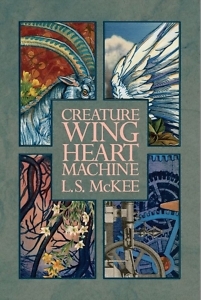 In an early poem, “Alva and the Swell,” we follow as she surfs complex memories of desire while trying, uneasily, to fall asleep, her “waking mind // a room she knows sleep could both / fill and unhinge.” Here, McKee creates a seamless, vibrant illumination of Alva’s inner world fused with her outer world, bringing us along as willing participants, wherever Alva may take us.
In an early poem, “Alva and the Swell,” we follow as she surfs complex memories of desire while trying, uneasily, to fall asleep, her “waking mind // a room she knows sleep could both / fill and unhinge.” Here, McKee creates a seamless, vibrant illumination of Alva’s inner world fused with her outer world, bringing us along as willing participants, wherever Alva may take us.
But McKee also presents Alva as an alter ego, of whom the speaker in “The Birth of Alva” says: “Alva is and is not me.” A second self, Alva becomes a mutable figure in these poems, both a lens and a reflection. In another poem, McKee writes, “One rule of nuclear physics: // in collapse there is light. Energy, like a rejected lover, / has to go somewhere. To stay is an impossibility.”
Throughout Creature, McKee brings a particular kind of tenderness to bear on such moments of change, especially times of liminality, uncertainty, or upheaval. In “Lonesome Thing,” McKee observes that when we pause during such threshold moments, not yet sure how we will choose to act, “a longing lingers, a stillness that contains / every beloved thing that kneels and drinks.”
Even while depicting moments of emotional danger, Creature, Wing, Heart, Machine itself creates a lingering sense of longing. Richly imagined and intimate in its observations, Alva’s world becomes a place we do not wish to leave.
Creature, Wing, Heart, Machine
By L.S. McKee
Zone 3 Press
91 pages
$17
Shuly Xóchitl Cawood’s Something So Good It Could Never Be Enough
In her new collection, Something So Good It Could Never Be Enough, Shuly Xóchitl Cawood engages the inherent messiness of our lives. Searching potent memories and the rituals of daily life, Cawood’s poems yearn for deeper reassurance in cycles of loss and renewal. But more often than not, that reassurance can be found in the untamable, sometimes unnamable, details.
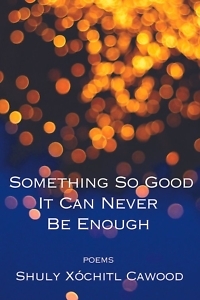 Cawood, who lives in East Tennessee, previously explored some of this terrain in her 2020 story collection, A Small Thing to Want, and her 2021 poetry collection, Trouble Can Be So Beautiful at the Beginning. This new collection addresses the tenuous quality of everyday revelations, at times turning melancholy and at others, hopeful.
Cawood, who lives in East Tennessee, previously explored some of this terrain in her 2020 story collection, A Small Thing to Want, and her 2021 poetry collection, Trouble Can Be So Beautiful at the Beginning. This new collection addresses the tenuous quality of everyday revelations, at times turning melancholy and at others, hopeful.
The book’s opening prose poem, “My Mother Says She Does Not Know How to Cook,” describes the sense of graceful ease the speaker’s mother — who immigrated to America from Mexico as a teenager — brings to the kitchen, even as she insists that she cannot cook. Her mother received no instruction, in numerous respects, but finds her own her way, nourishing her daughter well with the improvised “dishes she concocted to make sense of the kitchen in which she found herself.”
An early divorce — and the shadow it casts on subsequent relationships — provides this collection with a wealth of observations about change, loss, freedom, and desire. Running underneath these poems is a drive to reckon with patterns of the past and recognize their moments of beauty, however fleeting.
“Your Story Here” names the speaker’s need to tell deeper, more complex stories that dispense with the shiny surface versions of our lives. The speaker tries to list the kinds of stories she means, then pauses, and tries again: “What I mean is // a story that’s saintly but with secrets: the binge / watch of a bad series, a little weed, an affair / that according to the story is over but never / is.”
The hope found in these poems is usually hard-won, as expressed in “What It Takes.” The speaker observes the freighted nature of what she sees in the sky during sunrise. “The sun does not rise easily,” considering the collective weight of wars and ideological conflict the planet has to haul around each night. “The colors, not simple either — all splotches of red / and orange and another hue so hard to name I only know / it’s bold enough to smear the sky.”
Against this sense of unease, the speaker extends a message, both warning and encouragement: “Do you have what it takes? You must, / for you’re a girl and no one will hand it / over, just like that. Be the rising sun. Be // the hue I cannot name.”
By insisting on this hopeful gesture toward the future, Cawood softens the poem’s darker tone, offering solace for what’s been lost. Such gestures are abundant in Something So Good It Could Never Be Enough.
Something So Good It Could Never Be Enough
By Shuly Xóchitl Cawood
Press 53
82 pages
$17.95

Emily Choate is the fiction editor of Peauxdunque Review and holds an M.F.A. from Sarah Lawrence College. Her fiction and essays have appeared in Mississippi Review, storySouth, Shenandoah, The Florida Review, Rappahannock Review, Atticus Review, Tupelo Quarterly, and elsewhere. She lives near Nashville, where she’s working on a novel.
